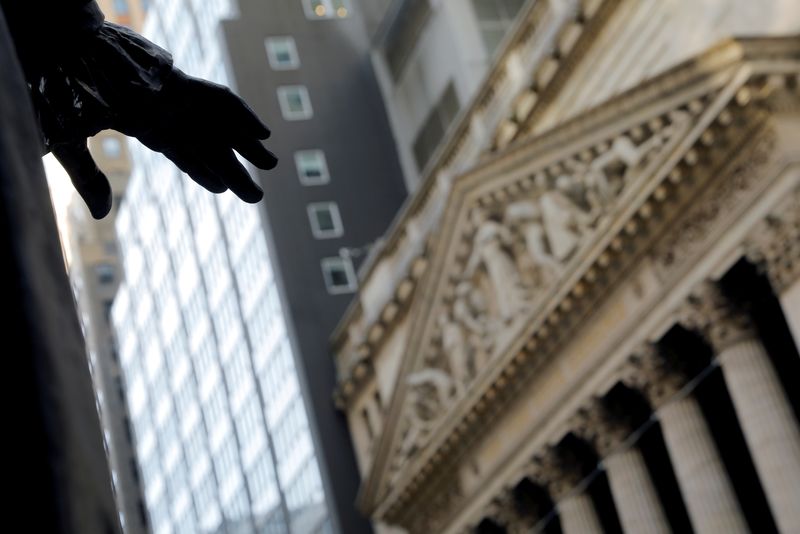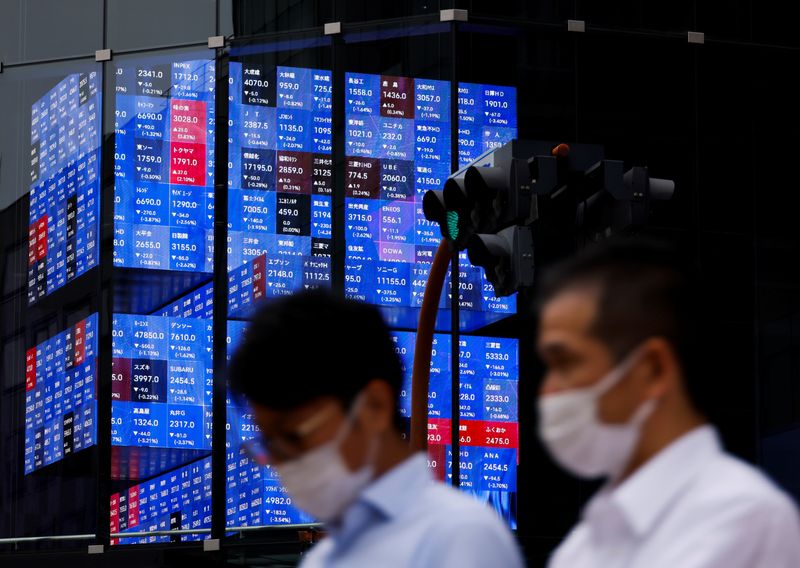By Sinéad Carew
NEW YORK (Reuters) -Wall Street stocks rallied on Thursday, while Treasury yields fell for the third straight day as investors digested data showing a declining U.S. economy for a second straight quarter, a day after the Federal Reserve hiked interest rates.
The dollar dropped to a six-week low against the yen, tracking the decline in Treasury yields, after the economic data, which fueled speculation that the Fed will not raise rates as aggressively going forward.
U.S. second-quarter gross domestic product (GDP) fell at a 0.9% annualized rate, according to the Commerce Department's advance estimate. This compares with economist expectations for 0.5% growth and came after a first-quarter contraction of 1.6%.
The data followed a Fed commitment on Wednesday to not flinch in its battle against the most intense U.S. inflation since the 1980s, even if that means a "sustained period" of economic weakness and a slowing jobs market.
U.S. equities had also rallied on Wednesday as Fed Chair Jerome Powell's comments prompted bets that rate hikes would begin to slow and lead to rate cuts in 2023. [.N]
The decline in treasury yields on Thursday implied bets for a more gradual pace of tightening going forward, according to Mona Mahajan, senior investment strategist at Edward Jones who also noted that GDP declined at a time when the Fed had not raised rates that much.
"It's certainly going to be an interesting balance between hopefully inflation moderating but then consumers having to face a more challenging economic backdrop," Mahajan said. "We don't see the scope for a deep and prolonged recession but the slowdown the market is pricing in is likely to come to fruition in the next couple of quarters, maybe even into the first quarter of 2023."
While the S&P has "done a lot of the work to the downside to price in a moderate recessionary environment," Mahajan sees more volatility ahead as "the fundamentals play a little bit of catch up."
After starting the day weaker, U.S. equities turned positive an hour into the trading session and took off from there. [.N]
The Dow Jones Industrial Average rose 332.04 points, or 1.03%, to 32,529.63, the S&P 500 gained 48.82 points, or 1.21%, to 4,072.43 and the Nasdaq Composite added 130.17 points, or 1.08%, to 12,162.59.
MSCI's gauge of stocks across the globe gained 1.24%.
Despite Europe facing a gas crisis and an expected recession, the pan-European STOXX 600 index rose 1.09%. (EU)
In bond markets, two-year Treasury yields fell further on Thursday after dipping under 3% on Wednesday. [US/]
The spread between two- and 10-year Treasury yields, seen as a recession signal when the short end is higher than the long, narrowed on Thursday. The spread had pulled back sharply on Wednesday.
Benchmark 10-year notes last rose 17/32 in price to yield 2.6723%, from 2.732% late on Wednesday. The 30-year bond last fell 12/32 in price to yield 3.0219%, from 3.002%.
The 2-year note last rose 6/32 in price to yield 2.8723%, from 2.972%.
In currencies, the dollar index fell 0.197%, with the euro down 0.06% to $1.0196.
"For now, the market is running with the idea that slowing growth will cause the Fed to blink and that we're entering a recession," said Mazen Issa, senior FX strategist at TD Securities in New York.
The Japanese yen strengthened 1.71% versus the greenback at 134.27 per dollar, while Sterling was last trading at $1.218, up 0.24% on the day. (FRX)
As the euro contends with an energy crisis, the IMF warned that if Russia, which reduced gas delivery to Europe this week, completely cuts off supplies by year-end, the region could face zero economic growth next year.
Oil prices were mixed as concerns that a global recession would knock energy demand were offset by lower crude inventories and a rebound in U.S. gasoline consumption.[O/R]

U.S. crude settled at $96.42 per barrel, down 0.86% while Brent settled up 0.49% at $107.14 on the day.
Spot gold added 1.3% to $1,756.59 an ounce as the U.S. economic contraction boosted its safe-haven allure. [GOL/]
